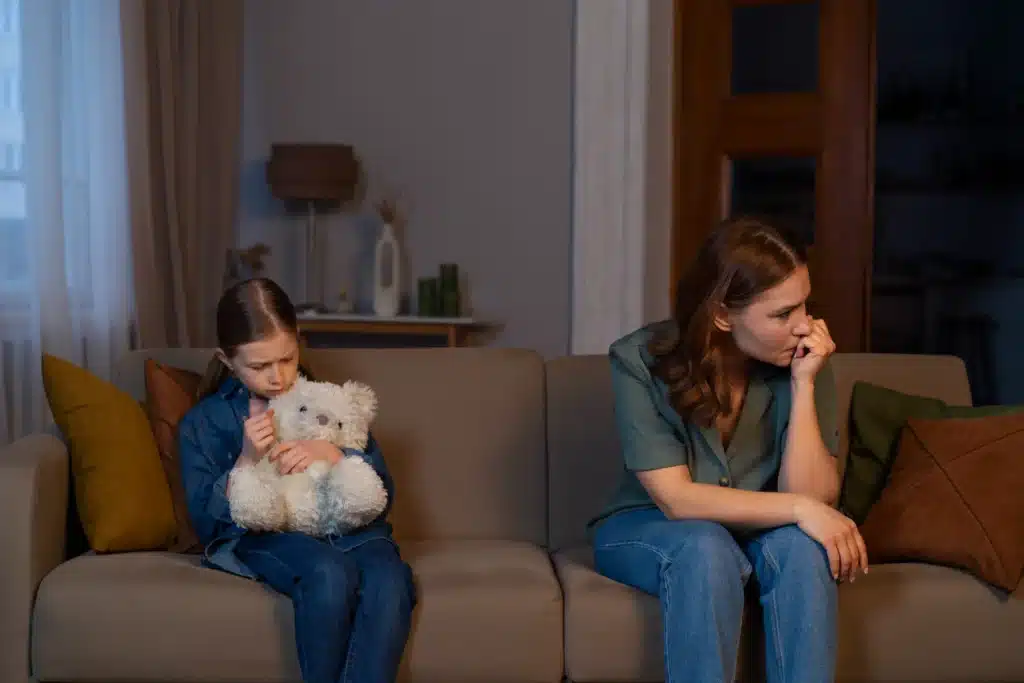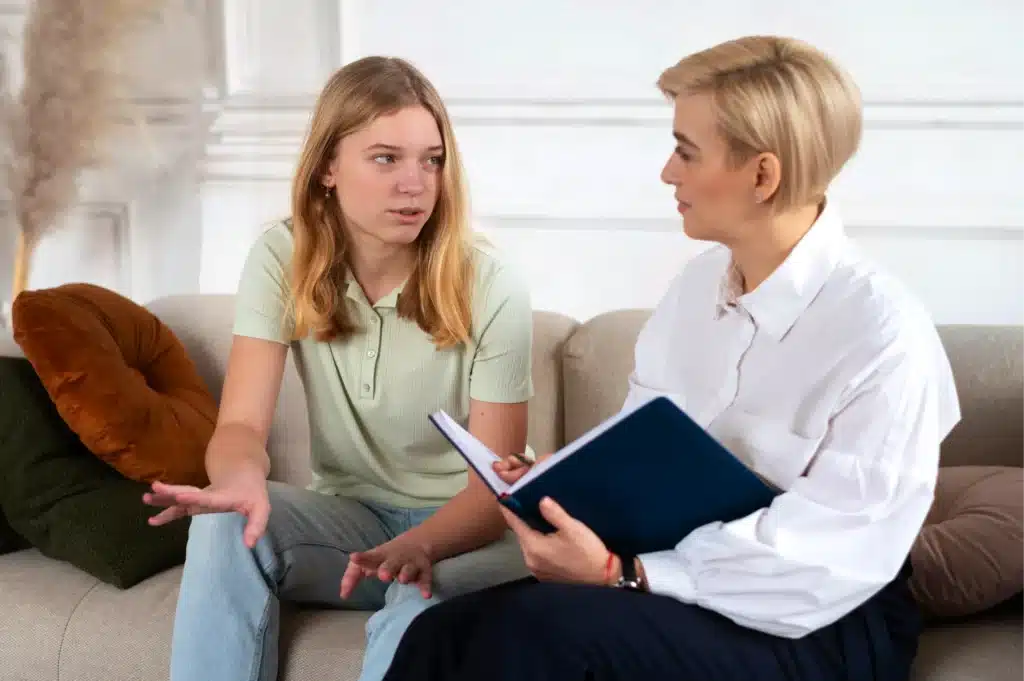Therapy for single mothers is crucial since, despite your love for your children, you are frequently supposed to handle a lot of the duties. Between work obligations, paying the bills, helping with the homework, and trying to catch some well-deserved downtime, making time for yourself can seem impossible. With time, this stress, exhaustion, and overwhelming isolation create obstacles to your mental health.
In the United States, it is estimated that almost one out of every four children lives with a single mother. Stress, anxiety, and isolation are common problems for many of these moms. That is where therapy for single mothers provides the space to remind you that you’re not in it alone.
From free to low-cost to flexible therapy options, this supportive environment provides a place where you can share your struggles, release some pressure, and find tangible tools to manage your situation.
In this blog, I want to have a real conversation with you about Therapy for Single Mothers. I’m not just here to provide you with information about therapy, but to help you find the kind that will work best for single mothers. Consider it a guide from one mom (or friend) to another.
Why Therapy for Single Mothers is Important
Let’s face it: being a single mom is not just hard work; it can sometimes feel downright impossible. Single mothers were also found to report high levels of psychological distress compared with married mothers in a 2018 study in the Journal of Family Issues. And honestly, it makes sense. You’re:
- Ignoring the joy of having personal time
- Constantly worrying about money and not knowing what’s going to happen
- All the feelings and needs of your kids are on your shoulders
- A lack of companionship at the end of the day can leave you feeling lonely.
Therapy for single mothers sometimes proves the best self care for single moms, providing a lifeline of strategies and support. Overall, it serves as a reminder that you’re not travelling this path alone and a ray of optimism despite your challenging obligations.
Single Mother Depression: What It Looks Like and Why It’s Common

I’m sure you have heard of “mom burnout,” but single mother depression runs deeper. A study in the journal Paediatrics found that at some point, close to 40% of single mothers have symptoms of depression. It often looks like:
- Fatigue even when you get plenty of sleep
- Suddenly losing interest in hobbies or things you used to love
- Difficulty in Concentration
- Suffering from guilt over “doing enough”
- Anger, sadness, irritation, or concern all the time
Sound familiar? If you are going through this, remember that you do not have to suffer in silence. Therapy can give you the real-life tools, such as cognitive behavioural therapy (CBT). CBT will help you identify and change negative thought patterns, enabling you not only to feel better but also to feel more in control of your life.
Types of Therapy for Single Mothers
Every mother’s journey is different; therefore, the therapy that helps also varies. Here are some options worth exploring:
1. Individual Therapy for Single Mothers
Sometimes you need a room all to yourself, free from kids, work expectations, and judgment. Individual therapy provides a safe space where you can openly explore your thoughts and feelings. A therapist will listen, provide advice, and acknowledge your feelings, whether financial stress, emotional challenges, or the daily difficulties of single parenting are involved. It’s an important reminder: you don’t have to carry the world on your shoulders alone.

2. Group Therapy for Single Mothers
Now imagine a circle of mothers, either metaphorically or through the digital world, who truly understand what you’re going through. Group therapy for single mothers feels different from personal therapy.
In many ways, it can be more impactful when you recognise that this is a room full of shared experiences and communal support. You tell your stories, accompanied by tears and sometimes laughter, and you leave with a lighter heart. Consequently, you may walk away with a greater sense of connectedness and understanding after group therapy.
3. Family Therapy for Single Mothers
Kids need motivation and support sometimes, too. Family therapy provides a loving and supportive space for a single mom and her children to connect and co-create a more conscious space. In this process, families gain compassion, bond closer together, and collaborate as a team. Most importantly, family therapy fosters a loving context where none of the family members has to struggle.
4. Online Therapy for Single Mothers
Online counselling for single mothers can really be a lifesaver when getting a babysitter or taking off work can sometimes be difficult. In that case, several websites are available (such as BetterHelp, TalkSpace, and 7 Cups) that offer sessions from home via phone call or text.
In fact, according to research by the American Psychological Association, therapy for single mothers conducted over video or phone calls can be just as effective as in-person therapy. If in-person therapy is not possible, know that there is potential to still get help that works for you.
Free Therapy for Single Mothers (Yes, It Exists!)
Individual therapy for single mothers in the United States can range from $100 to $200 per session. With limited finances due to being a one-income household, this option may not seem affordable. However, there is support available without having to pay the equivalent of a month’s mortgage; it just depends on what best fits you:
- Government Programs: Government programs, including Medicaid, Low-Income Medically Needy, and other related initiatives, provide low- or no-cost therapy services to moms with limited incomes.
- Sliding Scale Therapists: Some therapists offer sliding scale models that adapt to different income levels and may provide an initial visit at no charge.
- Community Nonprofit Organisations: Often, charitable groups like YWCA, United Way, or others will offer free counselling through funding and actively maintained relationships with local mental health professionals.
- University Clinics: University clinics offer the local community low-cost or free counselling services through graduate programmes under the guidance of licensed therapists.
- Hotlines: For immediate support and referral, you may use the National Parent Helpline (1-855-427-2736) or the Substance Abuse and Mental Health Services Administration Helpline (1-800-662-4357)
Real Stories: Single Mothers Who Found Strength
Take Jessica, a single working mom in Ohio. She attended therapy sessions provided for free through a university program, at first thinking, “Another thing I don’t have time for”. After a few weeks, she realised she was developing patience with the kids, and her stress level at work had decreased.
Elena, a working mom of three from California, has a second job at night. Her life is so complicated, and she found that traditional therapy wasn’t an option. Instead, she found BetterHelp and would schedule her sessions after her kids went to sleep. She said she saw a great deal of freedom in it.
Mom’s stories and stories like them show that therapy for single mothers is not just theory, it’s real-life mental health support for single moms.
Practical Tips to Begin Therapy as a Single Mother
Here are some helpful tips if you want to start therapy as a single mother:
- Set clear objectives in writing, such as healing or stress reduction.
- Seek therapy options that fit within your budget.
- Be open and honest about what you are really having issues with.
- If you have a particularly busy schedule, consider online therapy..
- Join groups and focus on resolving issues in those groups during therapy.
- To stay motivated in therapy, celebrate your small victories.

Finally, being a single mother requires strength, yet strength doesn’t mean carrying it all alone. Therapy for single mothers is all about giving yourself the space and support you deserve. Whether that’s free counselling through a local nonprofit, online therapy after the kids go to bed, or group therapy where other moms “get” what you are dealing with, there are many options for you.
If you are experiencing single mom depression, here’s the thing: Asking for help is not a weakness. It is the most courageous thing you can do. Getting help will not only assist you, but also your children.
So, if you’re ready, take the first small step, reach out today. You deserve it!




